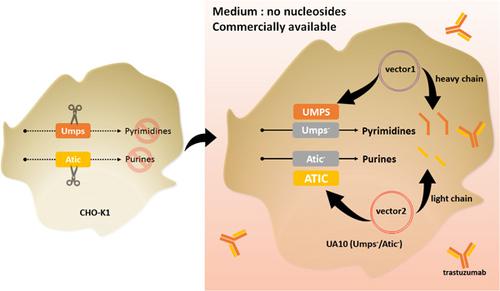当前位置:
X-MOL 学术
›
Biotechnol. Bioeng.
›
论文详情
Our official English website, www.x-mol.net, welcomes your
feedback! (Note: you will need to create a separate account there.)
A doubly auxotrophic CHO-K1 cell line for the production of recombinant monoclonal antibodies.
Biotechnology and Bioengineering ( IF 3.5 ) Pub Date : 2020-04-28 , DOI: 10.1002/bit.27367 Qinghao Zhang 1 , Bo Jiang 2 , Zhimei Du 2 , Lawrence A Chasin 1
Biotechnology and Bioengineering ( IF 3.5 ) Pub Date : 2020-04-28 , DOI: 10.1002/bit.27367 Qinghao Zhang 1 , Bo Jiang 2 , Zhimei Du 2 , Lawrence A Chasin 1
Affiliation

|
Chinese hamster ovary (CHO) cells are the most widely used mammalian hosts for recombinant protein production due to their hardiness, ease of transfection, and production of glycan structures similar to those in natural human monoclonal antibodies. To enhance the usefulness of CHO‐K1 cells we developed a new selection system based on double auxotrophy. We used CRISPR‐Cas9 to knockout the genes that encode the bifunctional enzymes catalyzing the last two steps in the de novo synthesis of pyrimidines and purines (uridine monophosphate synthase and 5‐aminoimidazole‐4‐carboxamide ribonucleotide formyltransferase/IMP cyclohydrolase [ATIC], respectively). Survival of these doubly auxotrophic cells depends on the provision of sources of purines and pyrimidines or on the transfection and integration of open reading frames encoding these two enzymes. We successfully used one such double auxotroph (UA10) to select for stable transfectants carrying (a) the recombinant tumor necrosis factor‐α receptor fusion protein etanercept and (b) the heavy and light chains of the anti‐Her2 monoclonal antibody trastuzumab. Transfectant clones produced these recombinant proteins in a stable manner and in substantial amounts. The availability of this double auxotroph provides a rapid and efficient selection method for the serial or simultaneous transfer of genes for multiple polypeptides of choice into CHO cells using readily available purine‐ and pyrimidine‐free commercial media.
更新日期:2020-04-28































 京公网安备 11010802027423号
京公网安备 11010802027423号